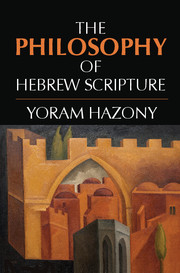Book contents
- Frontmatter
- Contents
- Acknowledgments
- Note on the Text
- Introduction Beyond Reason and Revelation
- Part I Reading Hebrew Scripture
- Part II The Philosophy of Hebrew Scripture
- 4 The Ethics of a Shepherd
- 5 The History of Israel, Genesis–Kings
- 6 Jeremiah and the Problem of Knowing
- 7 Truth and Being in the Hebrew Bible
- 8 Jerusalem and Carthage
- Part III Conclusion
- Appendix What Is “Reason”? Some Preliminary Remarks
- Notes
- Index of Names
- Index of Scriptural References
6 - Jeremiah and the Problem of Knowing
from Part II - The Philosophy of Hebrew Scripture
Published online by Cambridge University Press: 05 November 2012
- Frontmatter
- Contents
- Acknowledgments
- Note on the Text
- Introduction Beyond Reason and Revelation
- Part I Reading Hebrew Scripture
- Part II The Philosophy of Hebrew Scripture
- 4 The Ethics of a Shepherd
- 5 The History of Israel, Genesis–Kings
- 6 Jeremiah and the Problem of Knowing
- 7 Truth and Being in the Hebrew Bible
- 8 Jerusalem and Carthage
- Part III Conclusion
- Appendix What Is “Reason”? Some Preliminary Remarks
- Notes
- Index of Names
- Index of Scriptural References
Summary
One of the towering figures in the history of Israelite prophecy was Jeremiah ben-Hilikiahu of Anatot (c. 647–572 bce). Jeremiah warned of the coming destruction of the kingdom of Judah, and ultimately saw it with his own eyes. After the fall of Jerusalem, he continued to be active among the Judean exiles in Egypt. We know his thought principally from his prophetic orations, collected in the biblical book of Jeremiah, as well as from a historical narrative describing the last days of Jerusalem that is appended to them. Traditionally, Jeremiah was also regarded as the author of the book of Kings (the last part of the History of Israel) and Lamentations, and there is reason to think that he, or perhaps one of his students, may have been the final author of the History of Israel as a unified work. But today it is Jeremiah’s orations that are most closely associated with his name, and in this chapter I will examine one of the central themes of these speeches: his reflections on the question known to us from Platonic thought as the problem of knowledge and opinion.
In the Republic, Plato (c. 428–348 bce) famously distinguishes between knowledge and opinion, arguing that on any given question, human beings are found to embrace different opinions, each contradicting the others, as a result of the shifting and illusory nature of our experience of the world. Thus while almost everyone is persuaded that he knows much, in fact he knows almost nothing and spends his days the prisoner of worthless opinions that lead him astray. Knowledge of the things that truly are, Plato suggests, is available only by means of philosophy, which permits the soul to escape this realm of illusion and to enter into a realm of ideas that are eternal and unchanging.
- Type
- Chapter
- Information
- The Philosophy of Hebrew Scripture , pp. 161 - 192Publisher: Cambridge University PressPrint publication year: 2012



